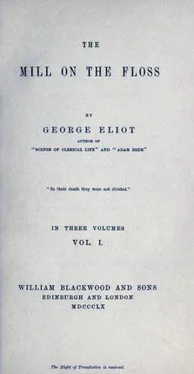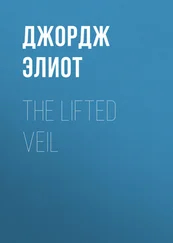Chapter III. The Wavering Balance
I said that Maggie went home that evening from the Red Deeps with a mental conflict already begun. You have seen clearly enough, in her interview with Philip, what that conflict was. Here suddenly was an opening in the rocky wall which shut in the narrow valley of humiliation, where all her prospect was the remote, unfathomed sky; and some of the memory-haunting earthly delights were no longer out of her reach. She might have books, converse, affection; she might hear tidings of the world from which her mind had not yet lost its sense of exile; and it would be a kindness to Philip too, who was pitiable, — clearly not happy. And perhaps here was an opportunity indicated for making her mind more worthy of its highest service; perhaps the noblest, completest devoutness could hardly exist without some width of knowledge; must she always live in this resigned imprisonment? It was so blameless, so good a thing that there should be friendship between her and Philip; the motives that forbade it were so unreasonable, so unchristian! But the severe monotonous warning came again and again, — that she was losing the simplicity and clearness of her life by admitting a ground of concealment; and that, by forsaking the simple rule of renunciation, she was throwing herself under the seductive guidance of illimitable wants. She thought she had won strength to obey the warning before she allowed herself the next week to turn her steps in the evening to the Red Deeps. But while she was resolved to say an affectionate farewell to Philip, how she looked forward to that evening walk in the still, fleckered shade of the hollows, away from all that was harsh and unlovely; to the affectionate, admiring looks that would meet her; to the sense of comradeship that childish memories would give to wiser, older talk; to the certainty that Philip would care to hear everything she said, which no one else cared for! It was a half-hour that it would be very hard to turn her back upon, with the sense that there would be no other like it. Yet she said what she meant to say; she looked firm as well as sad.
"Philip, I have made up my mind; it is right that we should give each other up, in everything but memory. I could not see you without concealment — stay, I know what you are going to say, — it is other people's wrong feelings that make concealment necessary; but concealment is bad, however it may be caused. I feel that it would be bad for me, for us both. And then, if our secret were discovered, there would be nothing but misery, — dreadful anger; and then we must part after all, and it would be harder, when we were used to seeing each other."
Philip's face had flushed, and there was a momentary eagerness of expression, as if he had been about to resist this decision with all his might.
But he controlled himself, and said, with assumed calmness: "Well, Maggie, if we must part, let us try and forget it for one half hour; let us talk together a little while, for the last time."
He took her hand, and Maggie felt no reason to withdraw it; his quietness made her all the more sure she had given him great pain, and she wanted to show him how unwillingly she had given it. They walked together hand in hand in silence.
"Let us sit down in the hollow," said Philip, "where we stood the last time. See how the dog-roses have strewed the ground, and spread their opal petals over it."
They sat down at the roots of the slanting ash.
"I've begun my picture of you among the Scotch firs, Maggie," said Philip, "so you must let me study your face a little, while you stay, — since I am not to see it again. Please turn your head this way."
This was said in an entreating voice, and it would have been very hard of Maggie to refuse. The full, lustrous face, with the bright black coronet, looked down like that of a divinity well pleased to be worshipped, on the pale-hued, small-featured face that was turned up to it.
"I shall be sitting for my second portrait then," she said, smiling. "Will it be larger than the other?"
"Oh yes, much larger. It is an oil-painting. You will look like a tall Hamadryad, dark and strong and noble, just issued from one of the fir-trees, when the stems are casting their afternoon shadows on the grass."
"You seem to think more of painting than of anything now, Philip?"
"Perhaps I do," said Philip, rather sadly; "but I think of too many things, — sow all sorts of seeds, and get no great harvest from any one of them. I'm cursed with susceptibility in every direction, and effective faculty in none. I care for painting and music; I care for classic literature, and mediæval literature, and modern literature; I flutter all ways, and fly in none."
"But surely that is a happiness to have so many tastes, — to enjoy so many beautiful things, when they are within your reach," said Maggie, musingly. "It always seemed to me a sort of clever stupidity only to have one sort of talent, — almost like a carrier-pigeon."
"It might be a happiness to have many tastes if I were like other men," said Philip, bitterly. "I might get some power and distinction by mere mediocrity, as they do; at least I should get those middling satisfactions which make men contented to do without great ones. I might think society at St. Ogg's agreeable then. But nothing could make life worth the purchase-money of pain to me, but some faculty that would lift me above the dead level of provincial existence. Yes, there is one thing, — a passion answers as well as a faculty."
Maggie did not hear the last words; she was struggling against the consciousness that Philip's words had set her own discontent vibrating again as it used to do.
"I understand what you mean," she said, "though I know so much less than you do. I used to think I could never bear life if it kept on being the same every day, and I must always be doing things of no consequence, and never know anything greater. But, dear Philip, I think we are only like children that some one who is wiser is taking care of. Is it not right to resign ourselves entirely, whatever may be denied us? I have found great peace in that for the last two or three years, even joy in subduing my own will."
"Yes, Maggie," said Philip, vehemently; "and you are shutting yourself up in a narrow, self-delusive fanaticism, which is only a way of escaping pain by starving into dulness all the highest powers of your nature. Joy and peace are not resignation; resignation is the willing endurance of a pain that is not allayed, that you don't expect to be allayed. Stupefaction is not resignation; and it is stupefaction to remain in ignorance, — to shut up all the avenues by which the life of your fellow-men might become known to you. I am not resigned; I am not sure that life is long enough to learn that lesson. You are not resigned; you are only trying to stupefy yourself."
Maggie's lips trembled; she felt there was some truth in what Philip said, and yet there was a deeper consciousness that, for any immediate application it had to her conduct, it was no better than falsity. Her double impression corresponded to the double impulse of the speaker. Philip seriously believed what he said, but he said it with vehemence because it made an argument against the resolution that opposed his wishes. But Maggie's face, made more childlike by the gathering tears, touched him with a tenderer, less egotistic feeling. He took her hand and said gently:
"Don't let us think of such things in this short half-hour, Maggie. Let us only care about being together. We shall be friends in spite of separation. We shall always think of each other. I shall be glad to live as long as you are alive, because I shall think there may always come a time when I can — when you will let me help you in some way."
"What a dear, good brother you would have been, Philip," said Maggie, smiling through the haze of tears. "I think you would have made as much fuss about me, and been as pleased for me to love you, as would have satisfied even me. You would have loved me well enough to bear with me, and forgive me everything. That was what I always longed that Tom should do. I was never satisfied with a little of anything. That is why it is better for me to do without earthly happiness altogether. I never felt that I had enough music, — I wanted more instruments playing together; I wanted voices to be fuller and deeper. Do you ever sing now, Philip?" she added abruptly, as if she had forgotten what went before.
Читать дальше












